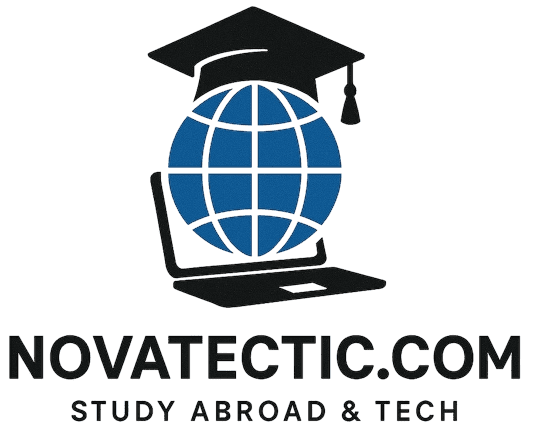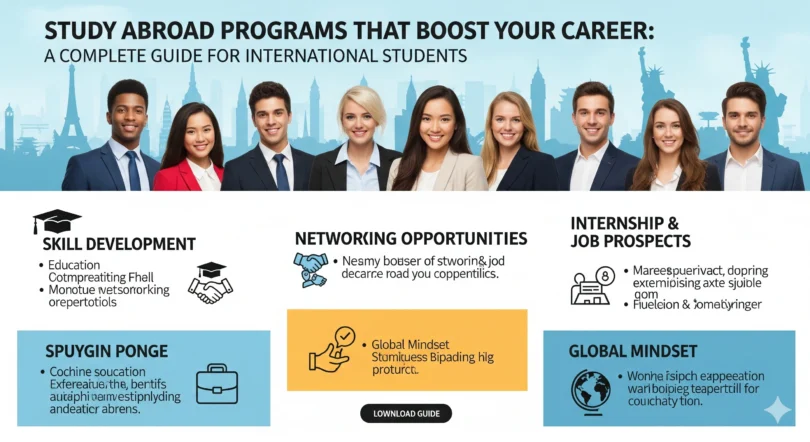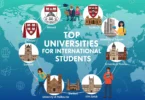Study Abroad Programs That Boost Your Career: A Complete Guide for International Students
Studying abroad is more than just earning a degree; it’s about building a career, gaining global exposure, and preparing yourself for the professional challenges of tomorrow. While many students focus on universities and countries, one of the most crucial factors is selecting career-focused study abroad programs. These programs are designed not only to provide academic knowledge but also to equip you with practical skills, professional connections, and real-world experience.
As someone who has guided students for over 15 years in international education, I have seen firsthand how choosing the right program can transform a student’s career trajectory. In this guide, I will share insights, strategies, and practical advice to help you pick programs abroad that truly boost your career prospects.
Why Career-Focused Programs Matter
When it comes to studying abroad, not all programs are created equal. A standard academic program provides knowledge, but career-focused programs go a step further:
- Practical Skill Development: These programs often include internships, co-op opportunities, and project-based learning that directly relate to your field.
- Global Networking: Exposure to multinational peers, faculty with industry experience, and professional workshops creates a network that can open doors worldwide.
- Higher Employability: Graduates from career-focused programs tend to have higher employment rates and often receive offers from top companies even before graduation.
- Industry Certifications: Some programs integrate industry-recognized certifications, adding significant value to your resume.
For instance, engineering students who enroll in co-op programs in Canada or the USA often complete multiple internships during their studies. By the time they graduate, they already have 12–18 months of work experience, making them far more competitive than peers who studied locally.
Key Features of Career-Focused Study Abroad Programs
When evaluating programs, look for the following features:
1. Internship and Co-op Opportunities
Hands-on experience is invaluable. Programs that integrate internships allow you to apply classroom knowledge in a professional setting. Look for universities that:
- Have partnerships with local and international companies
- Offer credit for internship work
- Support career services, CV building, and interview preparation
For example, the Rotman School of Management in Canada encourages students to work with leading financial firms, giving them exposure to real-world business challenges.
2. Industry-Oriented Curriculum
Career-focused programs are designed with industry input. They teach skills that employers actively seek, including:
- Technical expertise (data analysis, coding, engineering practices)
- Soft skills (communication, teamwork, leadership)
- Problem-solving and innovation
Programs like Imperial College London’s MSc in Innovation, Entrepreneurship, and Management are tailored to match current industry demands, ensuring students are job-ready upon graduation.

Career Counseling and Mentorship
3. Career Counseling and Mentorship
Quality programs provide guidance throughout your study period. Experienced mentors and career advisors can help you:
- Identify career goals
- Plan internships strategically
- Connect with alumni and industry professionals
Mentorship is particularly important for international students navigating unfamiliar job markets.
4. Global Exposure
Studying abroad naturally broadens your horizons. Programs that encourage global exposure through exchange programs, international projects, or study tours give students a competitive edge. Employers increasingly value candidates who can navigate multicultural work environments.

Certifications and Workshops
5. Certifications and Workshops
Some programs offer additional certifications alongside your degree, such as:
- Project Management Professional (PMP)
- Google Analytics or Digital Marketing certificates
- Coding bootcamps or financial modeling workshops
These certifications make your resume stand out and demonstrate specialized skills.
Top Career-Focused Study Abroad Programs by Field
Here’s a breakdown of career-focused programs that consistently boost employability:
1. Business and Management
- MBA with Internship: Many top universities in the USA, UK, and Canada integrate internships as part of their MBA programs.
- Finance & Accounting Programs: Co-op programs at universities like York University, Toronto or University of Melbourne prepare students for accounting and finance roles.
- Entrepreneurship Programs: Programs in the Netherlands or Singapore focus on startup ecosystems and hands-on projects.
2. Engineering and Technology
- STEM Co-op Programs: Universities like University of Waterloo (Canada) and Northeastern University (USA) offer co-op engineering programs that include multiple work terms.
- Specialized Certifications: Robotics, AI, cybersecurity, and data science programs provide technical skillsets in high demand globally.
- Research-Oriented Programs: Institutions like ETH Zurich (Switzerland) combine research projects with practical experience.
3. Arts and Creative Programs
- Design and Multimedia: Programs in Parsons School of Design (NY) or Royal College of Art (UK) incorporate studio work, internships, and industry collaborations.
- Performing Arts: Institutions like Juilliard School and Guildhall School of Music & Drama provide performance opportunities that can lead directly to professional careers.
4. Social Sciences and International Relations
- Global Policy Programs: Universities such as Johns Hopkins SAIS and Sciences Po (France) prepare students for careers in diplomacy, NGOs, or international organizations.
- Internships in Government or NGOs: Practical experience through internships is critical for these career paths.
How to Choose the Right Program
Selecting a program requires careful consideration. Here are my tips as a consultant who has guided thousands of students:
- Align with Career Goals: Ask yourself—where do I want to work after graduation? Choose programs with pathways in that field.
- Check Industry Connections: Programs with partnerships with companies or research labs give you practical experience.
- Look for Mentorship Opportunities: Personalized guidance can make a huge difference in landing internships and jobs.
- Evaluate Alumni Success: Research where previous graduates are employed; this reflects the program’s effectiveness.
- Consider Global Recognition: Internationally recognized programs make your degree valuable across countries.
Funding Career-Focused Programs Abroad
Cost is always a factor, but career-focused programs often come with scholarships, grants, and work opportunities:
- University Scholarships: Many top institutions offer merit-based or need-based scholarships.
- External Scholarships: Programs like Chevening, Erasmus+, Fulbright can fund study abroad.
- Part-Time Work: Some countries allow students to work part-time while studying, adding to your practical experience.
- Employer Sponsorships: In some cases, multinational companies sponsor students in programs that align with their workforce needs.
Personal Experience and Consultant Tips
In my 15+ years consulting international students, I have noticed that:
- Students who choose programs with internships land jobs faster than those who don’t.
- Even a short-term industry project during study abroad can double your network size in your field.
- Career-focused programs are not always the most expensive, but they provide the highest ROI in terms of career growth.
- Consulting with an experienced adviser helps you match your skills and goals to the most suitable program.

Maximizing Career Opportunities While Abroad
Maximizing Career Opportunities While Abroad
To fully leverage a career-focused study abroad program:
- Engage in Internships Early: Don’t wait until the final semester. Apply early to gain hands-on experience.
- Network Actively: Attend conferences, workshops, and networking events organized by the university.
- Build a Strong Online Presence: LinkedIn and personal portfolios showcase your work to potential employers.
- Seek Mentorship: Connect with faculty and industry mentors who can guide your career.
- Document Skills: Keep track of all projects, certifications, and achievements to strengthen your resume.
Conclusion: Why Career-Focused Programs Are Worth It
Career-focused study abroad programs are an investment in your future. They provide:
- Real-world skills and hands-on experience
- Industry connections and mentorship
- Certifications that enhance your resume
- Opportunities for global exposure and cultural adaptation
By carefully selecting the right program, international students can significantly accelerate their career growth, increase employability, and achieve global recognition in their field.
Remember, studying abroad is not just about earning a degree—it’s about shaping the next chapter of your professional life. Choose wisely, plan ahead, and leverage every opportunity that a career-focused program offers.









